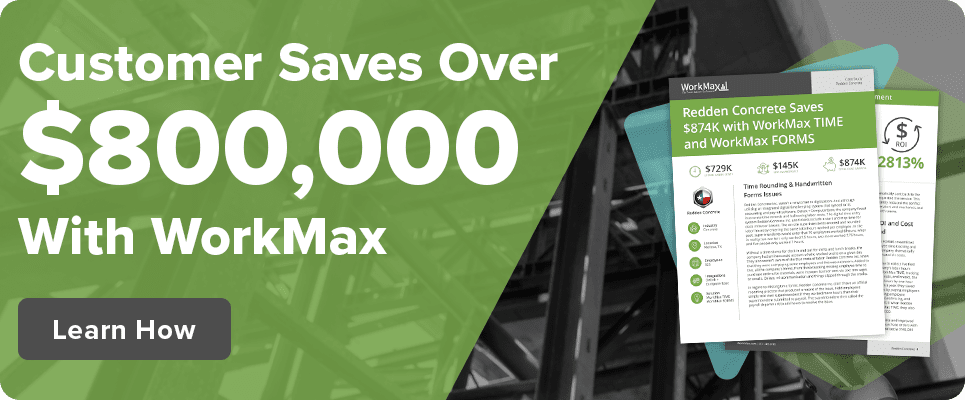Our users reported over 96% customer satisfaction for the last 10 years. Schedule a personal tour of our software to see how we can improve your business’s productivity.
Table of Contents
Share Article
Timecard fraud might be costing your construction business more than you think. If you’re still relying on handwritten timecards, you’re opening the door to problems like:
- Buddy punching
- Inflated hours
- Costly payroll mistakes
These issues can drain your profits faster than a busted water main.
Construction managers across the country are discovering that those innocent-looking paper timesheets are actually ticking time bombs for their bottom line.
The good news? Modern mobile entry systems and digital labor tracking tools are revolutionizing how contractors handle time management.
They are bringing unprecedented accuracy to jobsites while building the trust that every successful construction business needs.

Key Takeaways: What You Need to Know About Time Tracking Risks
- Handwritten timecards expose construction businesses to significant fraud risks, including buddy punching, hour inflation and rounding abuse that can drain profits quickly.
- Paper timecard systems create costly administrative burdens due to illegible handwriting, requiring payroll staff to spend hours deciphering entries and calling jobsites for clarification.
- Inaccurate labor tracking from paper systems makes it impossible to properly allocate project costs, leading to poor bidding decisions and potential project losses.
- Digital time tracking solutions with GPS verification eliminate buddy punching by confirming employees are actually at jobsites when they clock in.
- Construction companies using digital labor tracking tools gain detailed job costing data that enables better resource allocation and more profitable project management decisions.
The Real Cost of Time Theft in Construction
Time theft isn’t just about employees showing up late or leaving early. It’s a multi-billion dollar problem that hits construction companies particularly hard.
When workers can fudge their hours on paper timecards, even small discrepancies add up fast.
Buddy Punching
Buddy punching happens when one employee clocks in or signs a timecard for another worker who’s running late or absent.
On construction sites where crews often arrive at different times or work at multiple locations, this practice is surprisingly common. A worker might ask their buddy to mark them as present when they’re actually stuck in traffic or dealing with a family emergency.
These aren’t necessarily malicious acts. Sometimes workers genuinely believe they’re helping out a teammate. But the financial impact remains the same.
Hour Inflation and Rounding Abuse
Paper timecards make it tempting for workers to round up their hours. Started work at 7:03 AM? Why not make it 7:00? Left at 4:55 PM? Might as well call it 5:00.
These small adjustments might seem harmless, but they create a culture where time tracking becomes more about convenience than accuracy.
Some employees take this further, adding extra minutes to their lunch breaks or claiming overtime that wasn’t actually worked. When supervisors are managing multiple jobsites and crews, catching these discrepancies becomes nearly impossible with handwritten records.
Problems With Paper Timecards
Even honest employees make mistakes with paper timecards. These errors can be just as costly as intentional fraud.
Construction workers often have dirt on their hands, work in poor lighting conditions or need to fill out timecards quickly between tasks.
Illegible Handwriting and Data Entry Nightmares
Anyone who’s processed handwritten timecards knows the struggle of deciphering messy handwriting. Is that a 6 or an 8? Did they write 40 hours or 49?
When payroll clerks have to guess, mistakes are inevitable. These transcription errors can lead to underpaying workers (creating morale problems) or overpaying them (hitting your bottom line).
Payroll processing becomes a time-consuming detective game instead of a straightforward administrative task. Office staff spend hours calling jobsites to clarify confusing entries, pulling supervisors away from their real work to answer questions about timecard details.
Math Mistakes and Calculation Errors
Basic arithmetic errors plague handwritten timecards. Workers miscalculate their daily hours, forget to account for unpaid breaks or mess up overtime calculations. Even when the handwriting is clear, these mathematical mistakes create payroll headaches.
Supervisors reviewing paper timecards often catch these errors, but not always. When mistakes slip through, you’re either paying incorrectly or spending valuable time fixing the problems after the fact.
This reactive approach to labor tracking creates inefficiency throughout your entire operation.
Project Budget Disasters
Handwritten timecards make it nearly impossible to track exactly how much labor went into specific projects. Workers often forget which job they worked on during different parts of their day, or they allocate their entire shift to one project when they actually split time between multiple jobs.
This lack of precision in labor tracking leads to serious miscalculations in project costs. You might bid future jobs based on inaccurate historical data, either pricing yourself out of work or accepting projects that will lose money from day one.
Resource Allocation Problems
Without accurate time data, you can’t identify which crews are most efficient or which types of projects consistently run over budget.
Paper timecards provide a fuzzy picture of your operations. This makes it difficult to optimize crew assignments or identify training opportunities.
Digital tools give you granular visibility into how your labor resources are actually being used, enabling data-driven decisions about staffing, scheduling and project management.
Digital Solutions: Building Trust Through Technology

Modern time tracking technology eliminates most fraud opportunities while dramatically improving accuracy.
Mobile entry systems and digital labor tracking platforms provide the transparency and control that construction companies need.
GPS Integration and Location Verification
Today’s mobile entry apps use GPS technology to verify that employees are actually at the jobsite when they clock in. This simple feature eliminates buddy punching and ensures that workers are where they’re supposed to be when recording their hours.
Location verification also helps with job costing accuracy. When the system automatically logs which project site an employee was working at, there’s no guesswork about labor allocation.
Supervisors get real-time visibility into crew locations and can make informed decisions about resource deployment.
Real-Time Data and Instant Notifications
Digital systems provide immediate feedback when something looks off.
If an employee tries to clock in for an unusual number of hours or at an unexpected location, supervisors receive instant alerts. This real-time monitoring catches problems before they become expensive mistakes.
Cloud-based systems ensure that time data is immediately available to project managers and office staff.
No more waiting for paper timecards to make their way back to the office or dealing with lost paperwork from jobsites.
Automated Calculations and Error Prevention
Digital platforms eliminate math mistakes by automatically calculating daily hours, overtime and project allocations. Workers can’t accidentally (or intentionally) miscalculate their time because the system handles all the arithmetic.
Built-in validation rules prevent common errors like overlapping time entries or impossible work schedules. If something doesn’t make sense, the system flags it immediately rather than letting the error work its way through payroll processing.
Turn To WorkMax for Efficient Time Tracking Solutions
Paper timecards create unnecessary risks and inefficiencies that modern construction companies can’t afford to ignore. Timecard fraud, human error and inaccurate job costing data undermine profitability and create ongoing operational headaches.
Digital labor tracking solutions with mobile entry capabilities provide the accuracy and transparency that construction businesses need to thrive in today’s competitive market.
WorkMax offers comprehensive time tracking and project management tools designed specifically for construction companies. The mobile-first platform includes useful features like:
- GPS verification
- Real-time reporting
- Seamless integration with popular accounting software
Construction teams across the country trust WorkMax to eliminate time theft, improve payroll accuracy and provide the detailed job costing data needed for profitable project management.
Ready to see how digital time tracking can transform your operations?
Book a demo with our experts to discover how WorkMax can solve your time tracking challenges.

